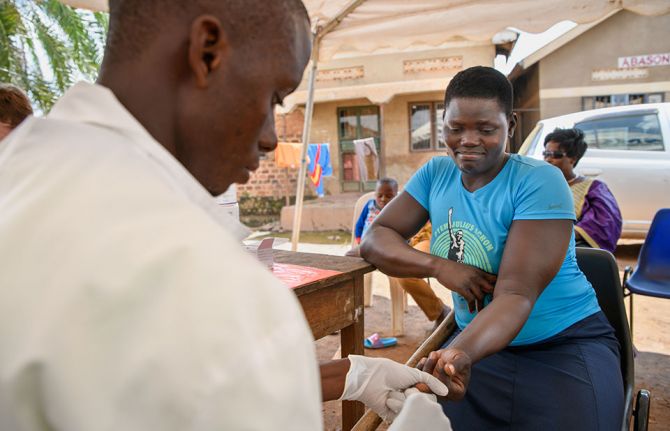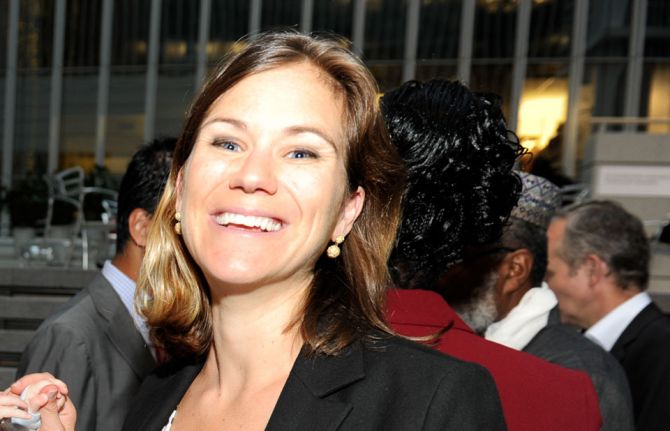
Feature Story
New report calls for policy changes on HIV and disability
11 November 2009
11 November 2009 11 November 2009Participants at the International Policy Dialogue, held in Ottawa, Canada, March 2009
Credit: Health Canada
A new report by Health Canada’s International Affairs Directorate has called for a greater focus on rights of people with disabilities in HIV policy. The report makes recommendations for policy change and follows an International Policy Dialogue held between UNAIDS, Health Canada and the Public Health Agency of Canada in Ottawa in March 2009.
Titled “HIV/AIDS and Disability: Final Report of the 4th International Policy Dialogue”, it calls for the United Nations' Convention on the Rights of Persons with Disabilities (CRPD) to become a catalyst for change by shifting the disability discourse from charity-based or medical-based approaches to a rights-based approach. This approach views people with disabilities as active participants in society, ensuring their wellbeing rather than treating them as passive recipients of charitable goodwill.
The report recommends the involvement of stakeholders in helping CRPD become a tool for change. These stakeholders include WHO, UNICEF, UNAIDS, national governments and ministries and civil society organizations working in the areas of disability and HIV.
There is a double stigma experienced by people living with both HIV and disability. Much effort is required to overcome this, beginning with raising awareness and open communication. For example, in South Africa youth with disabilities are trained to provide HIV prevention and treatment information to their peers; in Kenya HIV screening information is provided to the deaf by the deaf; and Uganda has established mental health clinics for people living with HIV. The report suggests taking a lead from these programmes.
The International Policy Dialogue meeting was organized by UNAIDS, Health Canada and the Public Health Agency of Canada
Credit: Health Canada
It calls for service providers in the AIDS response to be sensitised on how to interact with people with disabilities and to establish mobile voluntary counselling and treatment services to increase access to people living with disabilities who are unable to reach them on their own.
The HIV and Disability report recognises the need for more education and awareness for children, youth and adults living with developmental disabilities, and also suggests working on providing information on sexual and mental to people with disabilities.
The report discusses challenges related to sustaining pilot projects, securing funds, sharing the results and benefits of HIV, AIDS and disability projects, and educating donor countries, governments and NGOs in the value of investing in this area.
UNAIDS, along with WHO and the United Nations Office of the High Commissioner for Human Rights, has collaborated on a policy brief exploring the links between HIV and disability and that also makes recommendations for policy change.
Apart from discussing the actions needed to increase the participation of persons with disabilities in the HIV response and to ensure they have access to HIV services, it also recommends for governments to incorporate persons with disabilities into their national HIV policies.
It also urges civil society to ensure campaigns to combat stigma and discrimination of people living with HIV are also accessible to persons with disabilities and advocates for the latter to be included in planning, implementation and evaluation of HIV programmes.
People with disability
Around 650 million people, or 10% of the world’s population, have a disability. Although people with disabilities are found within the populations at higher risk of exposure to HIV, not much attention has been paid in the past to the relationship between HIV and disability.

Participants in breakout groups at the International Policy Dialogue, held in Ottawa, Canada, March 2009
Credit: Health Canada
People with disabilities and people living with HIV shared their personal experiences during the International Policy Dialogue in March to give voice to both the challenges they face and the abilities they hold.
Persons with disabilities experience all of the risk factors associated with HIV, and are often at increased risk because of poverty, severely limited access to education and health care, lack of information and resources, lack of legal protection, increased risk of violence and rape, vulnerability to substance abuse, and stigma.
New report calls for policy changes on HIV and di
Cosponsors:
Partners:
UN Office of the High Commissioner for Human Rights
Health Canada
Public Health Agency of Canada
Feature stories:
Disability and HIV in Jamaica (08 September 2008)
External links:
Journal of the International AIDS Society - Thematic page on HIV and Disability
Publications:
Policy brief: Disability and HIV (pdf, 207 Kb)
HIV/AIDS and Disability: Final Report of the 4th International Policy Dialogue



